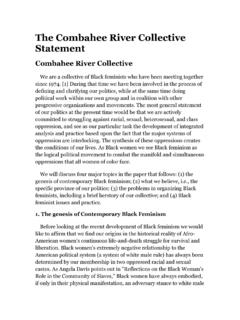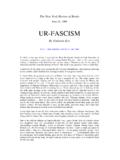Transcription of Patriotism and Global Citizenship as Values: A Research on ...
1 Journal of Education and Practice ISSN 2222-1735 (Paper) ISSN 2222-288X (Online). , , 2016. Patriotism and Global Citizenship as Values: A Research on Social Studies Teacher Candidates1. Ali Alt kula . The Faculty of Education, ukurova University, Adana, 01330, Turkey Abstract The ultimate aim of teaching Social Studies is to raise good citizens. However, raising good citizens has become a more complicated issue since the continuous change in social dynamics demands continual revisions on curriculums. Beyond the question of Should the children be raised as patriot individuals? a growing number of studies conducted on Education Science concentrate on the notion of Global Citizenship . The purpose of Social Studies' education process is not bringing up students who are isolated from society and are blind patriots. Then the question arises, what type of Citizenship should be developed within the education system?
2 This Research aims to put forward the notion of Global Citizenship and Patriotism as each of them is a value within the Social Studies course that has the mission of bringing up good citizens. The Research is the model case study. The data about Patriotism is collected through the scale that are developed by Schatz, Staub and Levine (1999). which is called, Patriotism Attitude Scale (PAS), on the other side, the data about Global Citizenship is collected through the scale developed by Morais and Ogden (2011) which is called Global Citizen Scale (GCS) collected from the participants. The Research study group consist of 144 Social Studies teacher candidates who are from two different state universities, who are in their senior grade. The Research data includes quantitative and qualitative data. In the analysis of the quantitative data, a computer-aided statistic program is used and in the analysis of qualitative data, content-analysis method was used.
3 The Research 's conclusion shows that the participants prefer Patriotism over Global Citizenship and constructive Patriotism against blind Patriotism . Keywords: Social Studies, Values Education, Patriotism , Global Citizenship 1. Introduction Social Studies deal with the development of individual in social context; this individual development as long as it is not damaging to the society that it has developed in, is supported by social studies. There are binding social boundaries that are designed by societies, which show appearance within a historical process (Armstrong, 1980). Values come on top of individual himself and the society that controls the individual (Yaz c , 2006). According to John Dewey, the value means a concept that should be primarily respected, appreciated and admired. It also means reaching to something and an act of protecting it, also comparing its value with other things and an act of reasoning on its nature (Venkataiah, 2007).
4 Values are motives that direct the behaviour of individual and motives that stay in individual's consciousness ( zg ven 1999). Values are mental phenomena which reside in affective domain and which control and direct our actions. Basically, if the values are compared to beliefs and attitudes, values are more comprehensive than both of them (Demircio lu and Tokdemir, 2008). The purpose of Values Education is to discover the child's best side that comes from his/her birth; to ensure the total development of individuality of the child; to help him/her reach the human perfection; to save and protect the society and the individual from bad morality and ethics, besides that it has the aim of bedighting the society and individual with good morality and ethics thus providing a continuity for the society. According to Venkataiah (2007), Values of Education means trying to provide an emphasis on humanism and it aims to inculcate children to think about other individuals and the welfare of their country.
5 The only way to achieve this goal is to make children feel a deep sense of the society's values. It is expected to find solution to the gradual disappearance of spiritual, ethical, social and aesthetical values of the society through formal Values of Education. Education Values are not acts to manipulate or brain-wash. The aim of Values of Education is to inspire people to choose their own social, ethical and spiritual values and help them understand these values more deeply by providing them some practical methods of understanding the contrast (Balc , 2008). The program that is applied for Social Studies in Turkey contains values such as, giving importance to the unity of the family, fairness, freedom, peace, liberty, being scientific, diligence, co-operation, sensitivity, honesty, aesthetic, tolerance, hospitality, giving importance to health, being respectful, affections, responsibility, being tidy, being helpful and being patriot.
6 There are different approaches about how to apply these values. These values might be applied by following the traditional inculcation methods or through the method of explaining the values, students might be provided with their own way of recognizing the values. Furthermore, moral reasoning and value analysis method could also be benefited from, in order to provide students a better understanding of values through systematic analysis (MONE, 2006). 1 This article was presented at International Conference on Quality in Higher Education (24-25 November 2016) held in Sakarya, Turkey. 26. Journal of Education and Practice ISSN 2222-1735 (Paper) ISSN 2222-288X (Online). , , 2016. The word Patriotism etymologically comes from Latin and can be characterized as being loyal to the sovereign. There are different perspectives towards the description of Patriotism on its content and its distinctive characteristics.
7 The most basic description of Patriotism is defined as a group's loyalty towards their members and the land they share in living (Bar-Tal and Staub, 1997). The researches about the idea of Patriotism put forward different definitions, for example some specific beliefs on a country's superiority through shared common national symbols and affection towards the country creates a rooted nation and plays a significant role on powering up the civilian bonds and national loyalty (Hurwitz & Peffley 1999; Spinner-Halevand Theiss-Morse 2003; Sullivan, Fried & Dietz 1992). The researchers reached a common consensus on the idea of Patriotism used on behalf of nationalism based on the idea of superiority and a concept against a foreign sovereignty (De Figueiredo and Elkins 2003;. Karasawa 2002; Kosterman and Feshbach 1989; Mummendey, Klink & Brown, 2001; Sidanius vd., 1997).
8 Social psychologists emphasize Patriotism 's main characteristics as loyalty, love and individual's desire of being a part of a community (Bar-Tal and Staub, 1997). Nathanson (1997) claims that Patriotism consist of 4 main components which are, a special affection towards one's country; defining himself or herself through his or her country; being interested in country's welfare; and sacrificing for the sake of country's welfare. According to Durkheim, homeland plays a key-role on the moralization process since it controls an existing society from the highest level of organization (Guibernau, 2007). Patriotism can't exist outside of a state or nation frame. Unlike nationalism , regionalism, tribalism and Patriotism has always been about a political society which is the concrete evidence of a nation or a state. A nation which is a social construction and limited in its political and social values is a community that exists in the members of this community's minds (Anderson, 1983).
9 nationalism might have played an important part on the construction of a nation but naturally, it has the element of innate pre-eminence in which nationalism might especially be destructive for multi-ethnical states. Unlike nationalism , Patriotism provides a concrete evidence for the unity of nation for the sake of its welfare. Ontologically, Patriotism is a social construct that develops gradually according to people's cultural activity (Berger & Luckman, 1966). It is natural that people show affection and compassion towards the place they love and it is also natural that people show affection towards their parents and groups in which they take part. However, in the development process of states, people were made to believe they are being part of a bigger community. So the natural boundaries are replaced by a margin towards an imaginary society such as princedom, kingdom, and empire or state (Rapoport, 2009).
10 nationalism and Patriotism both shows individual's relation with the nation. It is common that these terms are jumbled up. People tend to believe that they mean the same thing but there is a huge difference between nationalism and Patriotism . While nationalism puts emphasis on the heritance of language and cultural unity, Patriotism puts more emphasis on values and beliefs and aims to achieve love for country and nation. Orwell (1945). defines Patriotism as a term which has no intention of putting pressure on the other people, and it defines a place which is the best in the world and has the best life style and people's boundary toward this idea. Patriotism has a nature of protection both militaristic and cultural. On the other hand, nationalism can't be separated from the desire of authority. All nationalistic view has a common aim, that is, providing reputation and power for the nation is more important than the individual himself.

















